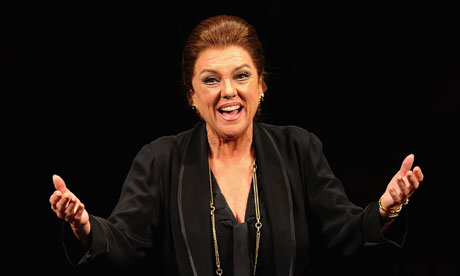|
The age of the genuine theatrical stinker is over. But there are still
plenty of terrible things to watch out for ...
 |
|
Bum notes ... Tyne Daly as Maria Callas in
Master Class at Samuel J Friedman Theatre, New York.
Photograph: Dimitrios Kambouris/WireImage |
In all the recent controversy about whether British theatre has become
more risk-averse as a result of the recession, one fact has been
overlooked: the virtual disappearance of the truly bad play. This has
happened for a simple reason. Production costs are now so high that
commercial theatre can no longer afford to mount the kind of rubbish
that was a staple part of my early reviewing life. And why would anyone
go out and see second-rate theatre when they can stay at home and watch
second-rate television?
Lousy plays used to come in two forms: drawing-room comedies and
thrillers. The former were an anaemic aftermath of the great NoŽl Coward
tradition, and dealt with such pressing matters as debs seeking ideal
spouses, dispossessed gentry slumming it in a Belgravia mews, or butlers
standing up for conservative values against mildly progressive
employers. Even worse were the whodunnits and thrillers which, if
English, took place in snowbound country houses and, if American, in
isolated Nantucket beach residences. After the success of the genuinely
good Sleuth and Deathtrap, by Ira Levin, one thing was also inevitable:
no corpse would take death lying down ever again.
But, even if the bulk of new writing now comes from the subsidised
sector, it is still in danger of breeding its own cliches. Following
humbly in the wake of the great American critic George Jean Nathan, who
once produced a list of the portents of a bad play (eg "When, as the
curtain goes up, you hear newsboys shouting Extra!, Extra!"), I append
my own list of contemporary signs, whether in new plays or classic
revivals, that audiences are in for a rough evening:
1. Any play in which a character aggressively masturbates within two
feet of the front row.
2. The moment a child emerges from an upstairs room to describe, in
graphic detail, his or her bad dreams.
3. Any site-specific show that seeks to intimidate the spectators by
asking them to pose as concentration-camp victims or inmates of an
institution to be pursued down darkened corridors by chainsaw-wielding
figures.
4. Plays that treat sad divas (Judy Garland, Maria Callas) less as
specific examples of showbiz misfortune than as tragic emblems of
suffering humanity.
5. Plays that invoke memories of Fred West, Josef Fritzl, the Soham
murders or the abduction of Madeleine McCann as an excuse for
titillation without offering any compensating psychological
illumination.
6. Any revival of a period comedy in which it takes approximately
seven-and-a-half minutes to get to the delivery of the author's first
line.
7. Productions that start with an ear-splitting burst of pop music to
announce their urgent contemporaneity.
8. Plays in which a run-down, travelling circus becomes a metaphor for
cultural decay.
9. Family dramas in which parental sexual abuse is saved until the
denouement, and produced like a rabbit from a hat, to explain the
preceding two-and-a-half hours of unrelenting misery.
10. Any play in which defecation is used to cover up dramatic defects.
This is a highly personal list, to which I'm sure you can add. But it's
a reminder that, even in an age when rank bad plays are far rarer than
they were in the age of commercial profligacy, the type is not wholly
extinct.
Do read: George Jean Nathan, Encyclopedia of the Theatre (Farleigh
Dickinson Press) |


